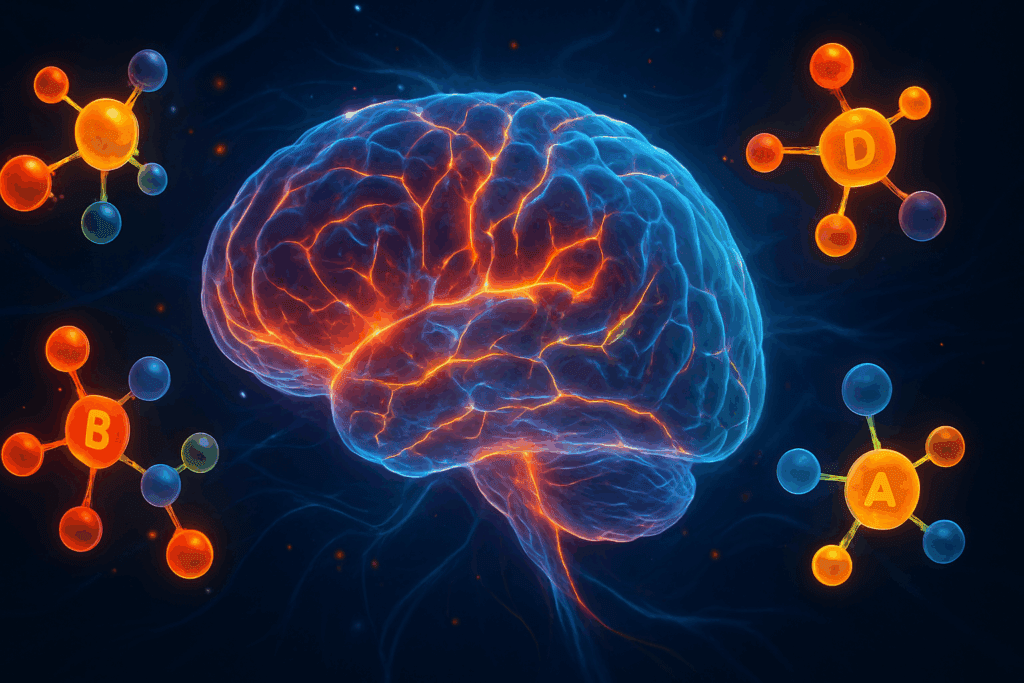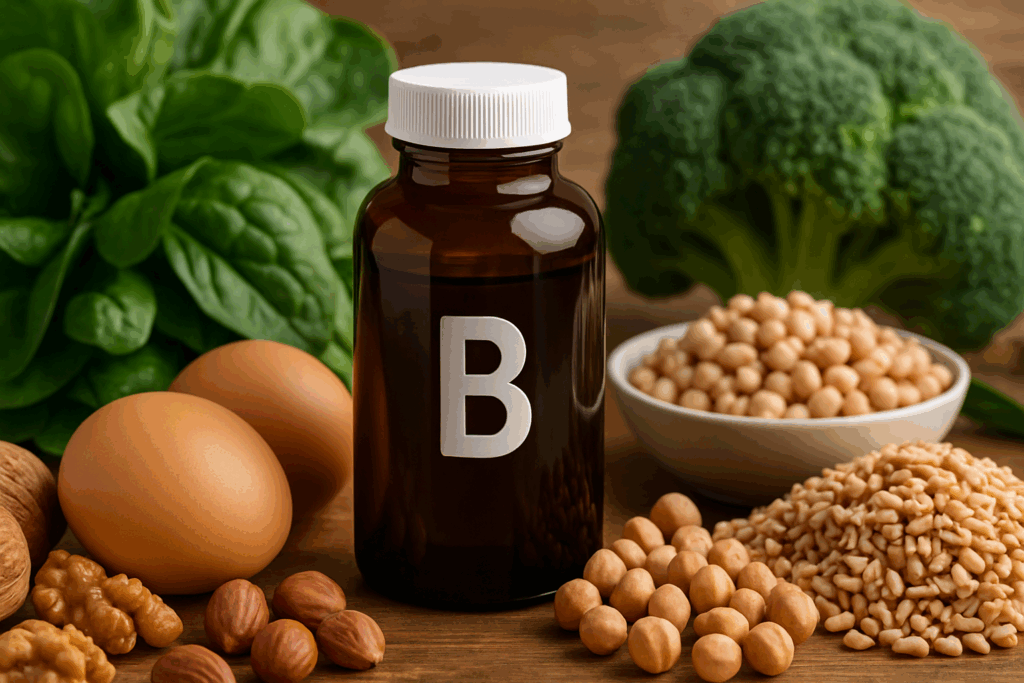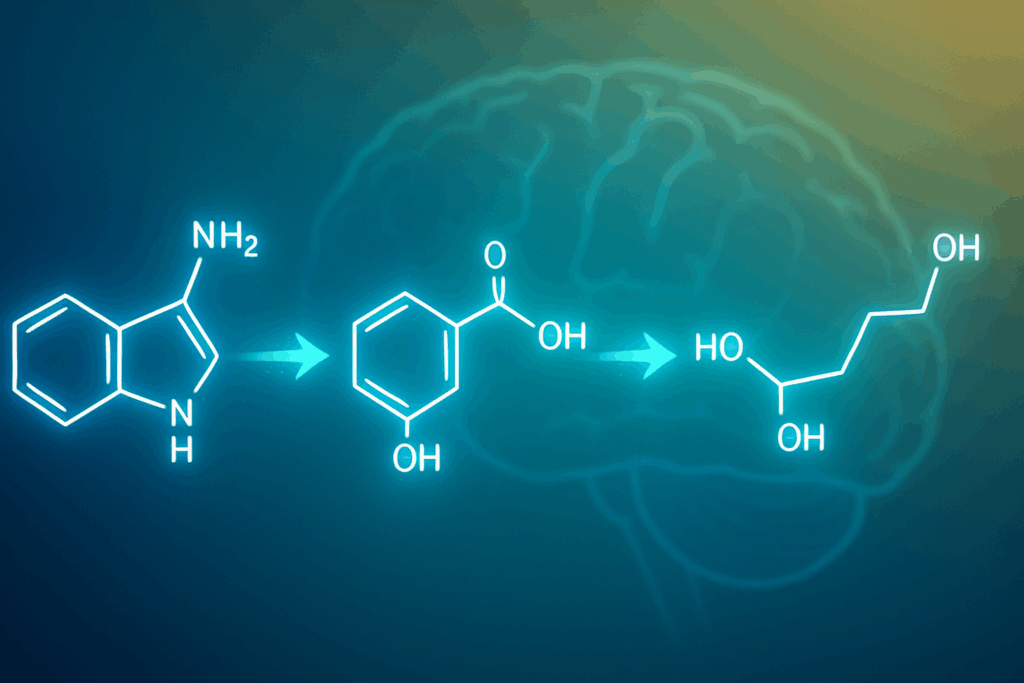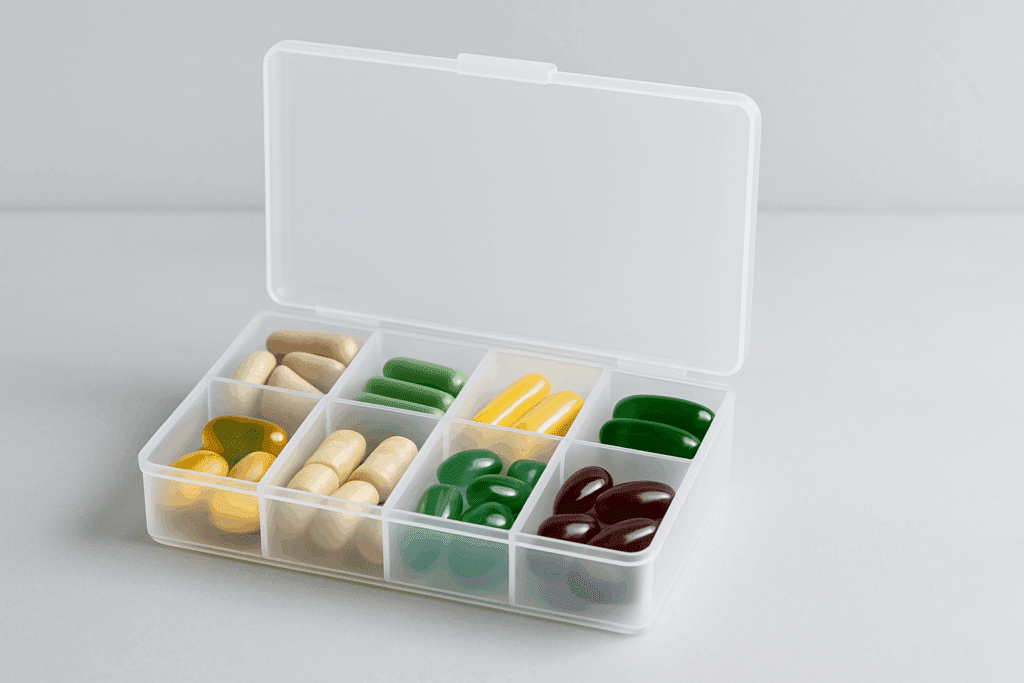In the ever-expanding realm of mental health care, a growing number of individuals are turning toward nutritional strategies to complement traditional therapies for mood disorders. The interest in using vitamin supplements for depression and anxiety reflects both a desire for holistic healing and a search for long-term cognitive support without the dependency or side effects that can accompany pharmaceutical options. But what vitamins are good for depression, and can they truly offer measurable support for emotional well-being? Emerging research suggests that the best vitamins for depression and anxiety may indeed play an important role in supporting neurotransmitter balance, reducing inflammation, and enhancing energy metabolism—key mechanisms tied to mental health.
You may also like : Best Rated Nootropics for Brain Health: Top Supplements to Enhance Focus, Memory, and Longevity
Understanding the complex interaction between nutrition and brain chemistry is essential to optimizing mental well-being. Unlike quick fixes or fad solutions, vitamins for mental health work gradually, targeting biological systems that underlie mood regulation. These nutrients, including the B-complex family, vitamin D, magnesium, omega-3 fatty acids, and others, are not miracle cures. However, when used appropriately, they may serve as powerful allies in stabilizing mood, improving emotional resilience, and supporting the long-term health of the nervous system. Let us explore what science reveals about the role of vitamins for depression and fatigue, and why specific nutrients are being recognized not only for lifting mood but also for contributing to brain longevity.

The Role of Nutrients in Brain Chemistry and Emotional Regulation
The brain is a metabolically demanding organ, consuming approximately 20% of the body’s energy despite comprising only about 2% of its mass. This energetic requirement means that it depends heavily on a steady supply of micronutrients to function optimally. Neurotransmitters such as serotonin, dopamine, GABA, and norepinephrine—chemical messengers central to emotion and behavior—are synthesized using vitamin-dependent enzymes. A deficiency in any one of these essential vitamins can disrupt neurotransmitter production, leading to symptoms of low mood, fatigue, and increased anxiety.
Nutritional psychiatry, a growing field of study, investigates how dietary patterns and specific nutrient interventions can influence mental health outcomes. Researchers have found correlations between poor dietary quality and increased incidence of mood disorders, suggesting that dietary improvements and targeted supplementation could help fill the gap left by conventional treatments. It is within this context that vitamin supplements for depression are gaining traction, offering not a replacement, but a scientifically grounded complement to therapy and medication.
Inflammation and oxidative stress also play critical roles in the development and maintenance of mood disorders. Nutrients such as vitamins C and E, selenium, and omega-3s act as antioxidants that can reduce neuroinflammation, a biological marker increasingly associated with depression and anxiety. This connection makes a compelling case for the inclusion of vitamins for tiredness and depression in a broader strategy aimed at enhancing mental and neurological resilience.

B-Complex Vitamins: Vital Cofactors in Mood and Energy Metabolism
Among the most researched nutrients in this category are the B vitamins, which include B1 (thiamine), B2 (riboflavin), B3 (niacin), B5, B6 (pyridoxine), B7 (biotin), B9 (folate), and B12 (cobalamin). Each of these plays a distinct yet overlapping role in supporting neurotransmitter synthesis and energy production. Folate and B12, for example, are essential for the methylation process that regulates gene expression and neurotransmitter balance. Low levels of these vitamins have been repeatedly linked to depressive symptoms.
B6 is instrumental in the synthesis of serotonin and dopamine, and without adequate levels, these mood-stabilizing chemicals cannot be produced in sufficient quantities. Clinical research has explored the connection between vitamin B and anxiety, finding that individuals with low B6 intake may experience heightened irritability and emotional sensitivity. Similarly, low B12 status is common in individuals with fatigue, memory issues, and mood swings—symptoms that can mirror or exacerbate clinical depression.
Notably, many practitioners now recommend a multivitamin for mental health that contains the full spectrum of B vitamins in bioavailable forms. These formulations are designed to support mood, reduce stress, and enhance cognitive clarity. Although these vitamins for mood swings and depression may not replace psychiatric medication in severe cases, they often provide substantial support in mild-to-moderate scenarios or as part of a long-term cognitive health plan.
Vitamin C: More Than Just an Immune Booster
While vitamin C is best known for its immune-boosting properties, its role in mental health is often underappreciated. This water-soluble antioxidant is involved in the biosynthesis of dopamine, norepinephrine, and serotonin—key neurotransmitters that directly influence emotional balance. Vitamin C also reduces oxidative stress in the central nervous system, which has been implicated in the pathophysiology of depression.
Clinical studies have shown that individuals with depressive symptoms often have lower plasma levels of vitamin C, and supplementation may yield improvements in mood, especially when deficiency is present. In a randomized controlled trial involving high school students, vitamin C supplementation led to significant reductions in anxiety scores. These findings support its inclusion among the best vitamins for good mood, particularly in populations exposed to high oxidative stress or psychological strain.
Additionally, vitamin C may work synergistically with other vitamins for mental health. For example, pairing it with iron enhances non-heme iron absorption, indirectly supporting energy production and cognitive performance—two areas often compromised in people with depression and fatigue.

Vitamin D and the Link Between Sunlight, Mood, and Neurochemistry
Often referred to as the “sunshine vitamin,” vitamin D is technically a hormone with receptors throughout the brain and body. It plays a multifaceted role in calcium regulation, immune function, and mood stabilization. Epidemiological studies consistently show a correlation between low vitamin D levels and higher rates of depression and seasonal affective disorder (SAD). While correlation does not equal causation, randomized controlled trials have demonstrated that supplementation can lead to mood improvements in individuals with vitamin D deficiency.
Vitamin D influences the expression of genes involved in the synthesis of serotonin, a neurotransmitter heavily implicated in mood disorders. Supplementing with vitamin D has been shown to support emotional resilience, particularly in populations at risk of low sun exposure such as those living in northern latitudes, working night shifts, or spending significant time indoors.
This makes vitamin D one of the most frequently recommended supplements for depression and anxiety, especially when blood levels fall below 30 ng/mL. In such cases, high-dose vitamin D therapy under medical supervision may not only restore deficiency but also support long-term cognitive longevity. As part of a broader supplement regimen, it is often combined with magnesium, omega-3 fatty acids, and B vitamins for synergistic mood support.
Vitamin E: Protecting Brain Tissue from Oxidative Damage
Vitamin E, a fat-soluble antioxidant, has neuroprotective effects that make it a candidate in the fight against depression and cognitive decline. It works by neutralizing free radicals and preventing lipid peroxidation in neural cell membranes. This antioxidant action is vital, as chronic oxidative stress is now considered a central mechanism in mood disorders and neurodegenerative diseases.
A growing body of evidence suggests that vitamin E deficiency can impair cognitive function and increase vulnerability to anxiety and depressive symptoms. Supplementation with vitamin E has been explored in clinical trials for its ability to enhance mood and reduce the severity of depressive symptoms, particularly in individuals with Alzheimer’s disease or age-related cognitive decline.
Although vitamin E is not typically included in lists of vitamins recommended for depression, it plays a supporting role in maintaining overall brain health. When combined with omega-3 fatty acids and B-complex vitamins, it forms a comprehensive antioxidant shield that helps prevent the inflammatory and oxidative damage often seen in mood disorders.

Magnesium: The Anti-Stress Mineral and Its Role in Mental Health
Magnesium is another critical player in the landscape of vitamins recommended for depression. This mineral regulates more than 300 biochemical reactions in the body and is essential for nerve transmission, muscle function, and stress modulation. Its calming effect on the nervous system has led many researchers to consider it a natural anxiolytic, capable of reducing symptoms of both acute and chronic anxiety.
A deficiency in magnesium can lead to heightened sympathetic nervous system activity, making individuals more reactive to stress and more prone to mood fluctuations. In clinical settings, magnesium has been explored as a treatment for generalized anxiety disorder, mild-to-moderate depression, and even premenstrual mood symptoms. Although it is not always classified among the best vitamins for good mood, its importance cannot be overstated when aiming to regulate the neurobiological systems involved in anxiety and depression.
Magnesium also supports sleep quality, which is often disrupted in those suffering from mental health issues. Poor sleep can aggravate symptoms of depression and fatigue, creating a feedback loop that further erodes emotional well-being. For these reasons, magnesium is frequently included in anti depression supplements and formulations targeting overall stress reduction.
Omega-3 Fatty Acids and the Brain’s Structural Needs
While not a vitamin in the traditional sense, omega-3 fatty acids deserve attention in this context due to their structural role in brain cell membranes and their anti-inflammatory properties. Composed mainly of EPA (eicosapentaenoic acid) and DHA (docosahexaenoic acid), omega-3s are integral to maintaining neuronal fluidity and signal transmission. Numerous studies have shown that low levels of these fatty acids are associated with increased risk of mood disorders, including depression and anxiety.
Supplementing with omega-3s has been shown to reduce symptoms in individuals with major depressive disorder, especially when the EPA component is higher than the DHA. The anti-inflammatory effects of omega-3s also make them useful supplements for depression and mood regulation, particularly in individuals experiencing brain fog, irritability, or low energy.
Because of their broad-spectrum benefits, omega-3s are often found alongside vitamins good for depression and energy in comprehensive brain health formulas. These combinations are increasingly viewed not just as short-term symptom relievers but as part of a strategy for long-term neuroprotection and cognitive enhancement.

Iron, Zinc, and Selenium: Trace Minerals With Outsized Influence
Though required in smaller quantities than vitamins, trace minerals like iron, zinc, and selenium wield powerful effects on emotional regulation. Iron is essential for oxygen transport and energy metabolism. Low iron levels, even in the absence of anemia, have been linked to fatigue, low motivation, and depressive symptoms. This overlap highlights the value of including iron among vitamins for depression and fatigue.
Zinc participates in hundreds of enzymatic reactions and plays a direct role in neurogenesis and synaptic function. Its antidepressant properties have been demonstrated in both animal and human models. Zinc levels often correlate inversely with depression severity, suggesting that supplementation may offer therapeutic benefits, particularly when zinc deficiency is present.
Selenium, while less often discussed, is vital for antioxidant function via its role in glutathione peroxidase. Low selenium levels are associated with increased risk of anxiety, depression, and cognitive decline. Together, these trace minerals reinforce the understanding that optimal mental health depends not only on major nutrients but also on the subtler elements that keep the brain’s biochemical machinery running smoothly.

Tryptophan, 5-HTP, and the Serotonin Pathway
Tryptophan is an essential amino acid that serves as a precursor to serotonin, the neurotransmitter most commonly associated with emotional regulation. The intermediate compound, 5-hydroxytryptophan (5-HTP), is often used in supplements to bypass the rate-limiting step in serotonin synthesis. These compounds do not fall under the category of traditional vitamins, but their inclusion in formulations alongside vitamins good for anxiety and depression is becoming more common.
Supplementing with 5-HTP has been shown to increase serotonin levels in the brain and improve symptoms of mild to moderate depression. However, caution must be exercised when combining 5-HTP with SSRIs or other antidepressants, as there is a potential risk of serotonin syndrome. For this reason, professional guidance is essential when integrating these compounds into a mood support regimen.
5-HTP is often paired with vitamin B6, which acts as a cofactor in the conversion of tryptophan to serotonin. This pairing ensures that the body can efficiently use dietary or supplemental tryptophan to boost mood without the metabolic bottlenecks that can occur in the absence of supportive nutrients.
Inositol: A Natural Modulator of Neurotransmitter Signaling
Inositol is a sugar-like compound found in high concentrations in the brain, where it plays a critical role in neurotransmitter signaling. Clinical studies have examined its effectiveness in treating a range of conditions, including anxiety, panic disorder, and depression. Inositol appears to modulate the action of serotonin, dopamine, and glutamate—three major neurotransmitters involved in mood regulation.
Randomized controlled trials have demonstrated that high doses of inositol (typically 12–18 grams per day) can produce antidepressant effects comparable to prescription medications, but without the same side effect burden. Although more research is needed, these findings suggest a place for inositol among vitamins that help with anxiety and depression, particularly in cases where traditional pharmacotherapy is poorly tolerated.
As a water-soluble compound, inositol is generally well tolerated and can be used alongside other vitamins for mood swings and anxiety. It is especially useful in women with premenstrual dysphoric disorder (PMDD) and those with polycystic ovary syndrome (PCOS), where hormonal imbalances can impact emotional regulation.
N-Acetylcysteine (NAC): A Glutathione Precursor with Psychiatric Benefits
N-Acetylcysteine, or NAC, is a derivative of the amino acid cysteine and serves as a precursor to glutathione, the body’s master antioxidant. Beyond its role in detoxification, NAC has shown remarkable promise in psychiatry for treating depression, bipolar disorder, and obsessive-compulsive disorder (OCD).
One of NAC’s key mechanisms is the regulation of glutamate, an excitatory neurotransmitter involved in anxiety and stress responses. By modulating glutamate levels and boosting antioxidant defenses, NAC helps stabilize mood and reduce the emotional volatility that often accompanies mood disorders. It is frequently recommended as one of the best vitamins for depression and anxiety in integrative mental health circles, despite being technically a non-vitamin compound.
NAC also reduces inflammation and improves mitochondrial function, aligning with broader strategies that use vitamins for depression and fatigue. Because of its multifaceted benefits, NAC is increasingly included in anti depression supplements designed to support long-term mental and neurological health.

Multivitamins for Mental Health: Comprehensive but Cautious Integration
For individuals seeking a simplified approach, multivitamins for mental health offer an all-in-one solution. These formulations often combine the best vitamins for depression and anxiety, including B-complex, D, C, and key minerals such as magnesium and zinc. While the convenience is appealing, not all multivitamins are created equal. Bioavailability, dosage, and ingredient quality vary significantly across products, and low-quality supplements may contain forms that the body cannot absorb efficiently.
Moreover, taking a multivitamin does not guarantee that all deficiencies will be corrected. For example, individuals with malabsorption syndromes, genetic polymorphisms, or chronic stress may need higher doses or specific formulations tailored to their unique needs. For this reason, it’s important to use multivitamins as part of a broader, personalized strategy that may include individual nutrients at therapeutic doses.
Nonetheless, when thoughtfully formulated, these products can serve as excellent baseline support—particularly for those dealing with vitamins for mood swings and anxiety or symptoms related to chronic stress and emotional exhaustion. As science continues to uncover the nuanced interplay between nutrition and mental health, these multivitamins will likely evolve to become more targeted and effective in addressing depression natural supplements.
Frequently Asked Questions (FAQ): Best Vitamins for Depression and Anxiety
1. How do vitamins for mental health differ from prescription antidepressants?
Vitamins for mental health often work by supporting the body’s natural biochemical processes, rather than artificially altering neurotransmitter levels in the way that antidepressants do. Unlike prescription drugs, vitamin supplements for depression generally have fewer side effects and are typically slower-acting, requiring consistent use over time for noticeable improvements. Many supplements for depression and anxiety aim to correct subtle nutrient deficiencies that may contribute to emotional instability or fatigue. For example, someone deficient in B12 may experience depressive symptoms that improve once that deficiency is addressed. This approach focuses on optimizing the nutritional foundation of mental wellness, rather than overriding brain chemistry directly, which is often the goal of pharmacological treatments.
2. Are there any overlooked vitamins that help with emotional resilience during seasonal changes?
Yes, beyond vitamin D, which is well-known for seasonal affective disorder, emerging research suggests that vitamin E and vitamin K2 may also support emotional resilience in shifting climates. Vitamin E plays a role in reducing oxidative stress triggered by environmental changes, while K2 supports brain cell membrane integrity and may reduce low-grade inflammation often seen during colder months. These nutrients are gaining interest as part of newer anti depression supplements that address seasonal mood shifts. Incorporating these into your routine alongside better-known vitamins for depression and fatigue may help reduce susceptibility to seasonal emotional imbalances. They’re particularly beneficial when combined with omega-3 fatty acids and a multivitamin for mental health.
3. How do genetics influence how well someone responds to vitamin supplements for depression?
Genetic variations can greatly affect nutrient metabolism, especially in pathways like methylation and folate conversion. For instance, individuals with an MTHFR gene mutation may not effectively convert folic acid to its active form, which is crucial for serotonin synthesis. This makes methylated forms of B vitamins essential for those individuals. Personalized supplementation is becoming more common, with genetic testing used to guide the selection of vitamins recommended for depression. Understanding your genetic makeup allows for a more targeted approach, making vitamin supplements more effective in addressing root causes rather than just symptoms.
4. Can vitamins for tiredness and depression help improve sleep quality too?
Absolutely, many of the best vitamins for depression and anxiety are intricately linked to circadian rhythm and melatonin production. Vitamin B6, magnesium, and tryptophan all contribute to serotonin synthesis, which in turn influences melatonin production, a hormone that regulates sleep. Poor sleep is both a symptom and a cause of depression, making this an important feedback loop to address. By improving sleep quality, these vitamins for depression and mood can indirectly boost daytime energy and emotional regulation. In practice, multivitamins that include these nutrients are often used as foundational support in sleep-focused mental health regimens.
5. How do vitamins for mood swings and depression interact with hormone levels, especially in women?
Hormonal fluctuations, particularly around menstruation or menopause, can intensify symptoms of anxiety and depression. Certain vitamins for mood swings and anxiety—such as B6, magnesium, and inositol—help regulate estrogen and progesterone balance, thereby stabilizing mood. B6 is especially useful in reducing symptoms of premenstrual syndrome (PMS) and has been shown to mitigate mood changes during hormonal transitions. These interactions make specific vitamins for depression and fatigue especially important for women, who may benefit from formulations that address both nutrient deficiencies and hormonal modulation. Personalized regimens often include these alongside traditional vitamins for anxiety and depression to create a more holistic support system.
6. Is there any evidence that combining supplements to help with depression is more effective than using a single vitamin?
Yes, multiple studies support the idea that synergy among nutrients enhances their effectiveness. For example, vitamin C enhances iron absorption, which supports energy levels, while B12 and folate work together in methylation pathways affecting serotonin production. Many of the best vitamins for depression work better when taken in concert, which is why multivitamin for mental health products are becoming more specialized and evidence-driven. When considering what vitamins are good for depression, it’s often best to use formulations that consider interdependencies rather than relying on isolated supplementation. This approach also mimics the complexity of a healthy diet, which rarely delivers nutrients in isolation.
7. How can someone tell if they need vitamins for depression and anxiety or if their symptoms require medical intervention?
While mild symptoms such as persistent fatigue, irritability, or difficulty concentrating might respond well to vitamin supplements for depression, more severe signs—such as suicidal thoughts, extreme emotional withdrawal, or complete disruption of daily functioning—require immediate professional help. That said, even individuals on medication may benefit from supplements for depression and anxiety when used under supervision. Blood tests can identify deficiencies in nutrients like B12, vitamin D, and magnesium, which often coincide with mood issues. For anyone wondering what vitamins are good for depression, consulting a qualified healthcare provider can help determine whether supplementation, therapy, medication, or a combination thereof is most appropriate.
8. How do anti depression supplements address both cognitive function and emotional health?
Many vitamins good for depression and energy, such as CoQ10, choline, and B vitamins, support mitochondrial function and neurotransmitter balance. These same nutrients are essential for maintaining cognitive clarity, memory, and focus. Anti depression supplements designed with cognitive longevity in mind often include compounds that stabilize mood while enhancing mental sharpness. For example, omega-3s can improve emotional regulation and also protect the structural integrity of brain cells. This dual effect makes such supplements especially valuable for those experiencing both mood disturbances and cognitive fog, highlighting the overlap between emotional and intellectual health.
9. What role do environmental factors play in shaping nutrient needs for emotional health?
Lifestyle and environmental factors—such as urban living, poor air quality, and high stress levels—increase the body’s demand for certain nutrients. For instance, exposure to pollution can deplete antioxidants like vitamin C and E, while chronic stress taxes the adrenal glands and depletes B-complex vitamins. In these contexts, supplements to help with depression often include adaptogens and additional vitamins that compensate for environmental wear and tear. If you’re seeking vitamins good for anxiety and depression in high-stress lifestyles, it’s essential to account for environmental nutrient drain. This highlights the need for personalized supplementation, as the optimal regimen for a desk-bound executive in a city might differ from that of someone living a low-stress, outdoor-oriented life.
10. Will vitamin B help with anxiety even if I don’t have a deficiency?
Yes, vitamin B and anxiety have a relationship that extends beyond correcting deficiencies. B vitamins, particularly B6, B9 (folate), and B12, are involved in the synthesis of calming neurotransmitters like GABA and serotonin. Even if blood levels appear normal, higher-than-average intake may support optimal brain function under high cognitive or emotional stress. People with anxiety often benefit from supplemental B-complex as part of vitamins that help with anxiety and depression, even in the absence of clinical deficiency. These vitamins for mental health support not only stress tolerance but also resilience and mood stability in the face of ongoing life challenges.
Conclusion: Integrating the Best Vitamins for Depression and Anxiety into a Holistic Mental Health Strategy
In today’s high-stress world, the search for safe, effective, and sustainable ways to support mental well-being has never been more pressing. While pharmaceuticals and therapy remain cornerstones of treatment for mood disorders, the emerging science around vitamins for depression and mood suggests that targeted nutritional support can play a pivotal complementary role. From vitamin B and anxiety management to the role of vitamin D in emotional resilience, each nutrient offers a unique pathway for promoting brain health and emotional stability.
What the latest research underscores is the interconnectedness of micronutrient status, neurotransmitter production, and inflammatory regulation in determining mental health outcomes. Supplements to help with depression should not be viewed in isolation but rather as part of a larger ecosystem that includes lifestyle changes, dietary quality, therapeutic intervention, and stress management. When used thoughtfully and under proper guidance, vitamins that help with anxiety and depression may reduce reliance on medication, enhance the effectiveness of therapy, and contribute to long-term cognitive vitality.
For individuals exploring natural alternatives, the best vitamins for depression and anxiety offer more than symptom relief—they provide a bridge to greater self-awareness, resilience, and emotional balance. By focusing on evidence-based strategies and ensuring that supplements are chosen based on bioavailability and individual needs, it is possible to integrate these powerful tools into a sustainable wellness plan. Ultimately, investing in your mental health through high-quality nutrients is not only a proactive step—it’s a scientifically sound choice for anyone seeking to thrive both emotionally and cognitively for years to come.
Further Reading:
8 Supplements that Can Help Reduce Anxiety, According to a Psychiatrist


